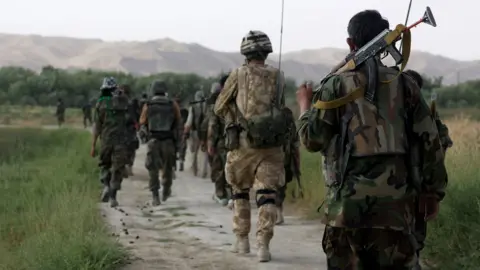Defence secretary 'unable to say' if anyone killed after Afghan data breach
 Getty Images
Getty ImagesThe defence secretary has said he was "unable to say for sure" whether anyone had been killed as a result of the data breach that revealed the details of thousands of Afghans who had supported British forces.
John Healey told the BBC it was "highly unlikely" being on the list would now increase the risk of being targeted by the Taliban.
Details of nearly 19,000 people who had applied to move to the UK after the Taliban seized power in Afghanistan were mistakenly leaked in February 2022 by a British official. The previous government learned of this in August 2023 when details were posted on Facebook.
Sir Keir Starmer said the Conservatives have "serious questions to answer" about the breach.
Speaking during Prime Minister's Questions, Sir Keir said the defence committee chair has "indicated he intends to hold further inquiries".
"I welcome that and hope that those who were in office at the time will welcome that scrutiny," the prime minister added.
A super-injunction blocking reporting about the breach was lifted on Tuesday.
Speaker Sir Lindsay Hoyle told the House of Commons the handling of the data breach raised "significant constitutional issues".
He said he has "asked the clerks to consider whether any lessons need to be learned from this case".
"If so, I will be reporting back to the House in due course," he added.
A resettlement scheme for those affected by the breach, the Afghanistan Response Route, set up in April 2024 after the then-Conservative government learned of the breach, has seen 4,500 Afghans so far arrive in the UK.
It has cost £400m, with a projected final cost of about £850m. A total of 6,900 people are expected to come to the UK under this scheme, which has now closed.
The Ministry of Defence (MoD) believes 600 Afghan soldiers included in the leak, and 1,800 of their family members, are still in Afghanistan.
But the existence of these relocations and the breach itself were kept secret until Tuesday when the super-injunction banning any reporting of the story was lifted in the High Court.
Healey told the BBC the lifting of the super-injunction would now allow "proper press reporting and scrutiny".
"You cannot have democracy with super-injunctions in place," he said.
Sir Ben Wallace, who was defence secretary for the Conservative government, said it had applied for a four-month injunction after it became aware of the breach, which a judge converted to a super-injunction.
He told BBC Radio 4's Today programme his priority had been to "protect those people who could have been or were exposed".
On Tuesday, Mr Justice Chamberlain decided to lift the super-injunction, saying the MoD's internal review found the Taliban "likely already possess the key information in the dataset" and confirmation of its existence was unlikely to "substantially" raise the risk faced by those impacted.
It was also announced that an email had been sent to those whose data was included in the breach, urging them to "exercise caution", and take steps like protecting their online activities and not responding to messages from unknown contacts.
Speaking in the Commons on Tuesday, Healey said the person involved in the leak was "no longer doing the same job", and offered a "sincere apology".
Downing Street has not said whether the official responsible for the leak has faced disciplinary action.
Healey said he was not "going to lead some witch hunt after a defence official - this is much bigger than the mistake of an individual."
Conservative leader Kemi Badenoch has also apologised on behalf of her party.
Former Conservative leader Sir Iain Duncan Smith said Parliament should have been informed about the leak.
He told the BBC's World Tonight: "Parliament cannot be ignored for that length of time, we owe a duty to the public to at least have examined this."
Conservative MP David Davis told LBC that given the "exceptional" nature of the data breach, the super-injunction was "arguably justifiable".
He added the breach raises "pressing questions about where we draw the line on state secrecy and how we ensure that transparency and accountability are not quietly sidelined".
The daughter of an Afghan translator whose details were leaked told the BBC's Newsnight programme that her whole family "panicked".
"No one knows where the data has been sent to - it could be sent to the Taliban, they could have their hands on it," she said.
Her grandmother, who is still in Afghanistan, is "completely vulnerable", she added.
The breach, which came after the withdrawal of US troops from Afghanistan in 2021, involved the names of people who had applied for the Afghan Relocations and Assistance Policy (Arap) scheme. The UK government set up the scheme to rapidly process applications by people who feared reprisals from the Taliban and move them to the UK.
The evacuation that followed - which saw 36,000 Afghans moved to the UK - has already been heavily criticised in the years since it was launched, with a 2022 inquiry by the Foreign Affairs Committee finding it was a "disaster" and a "betrayal".
